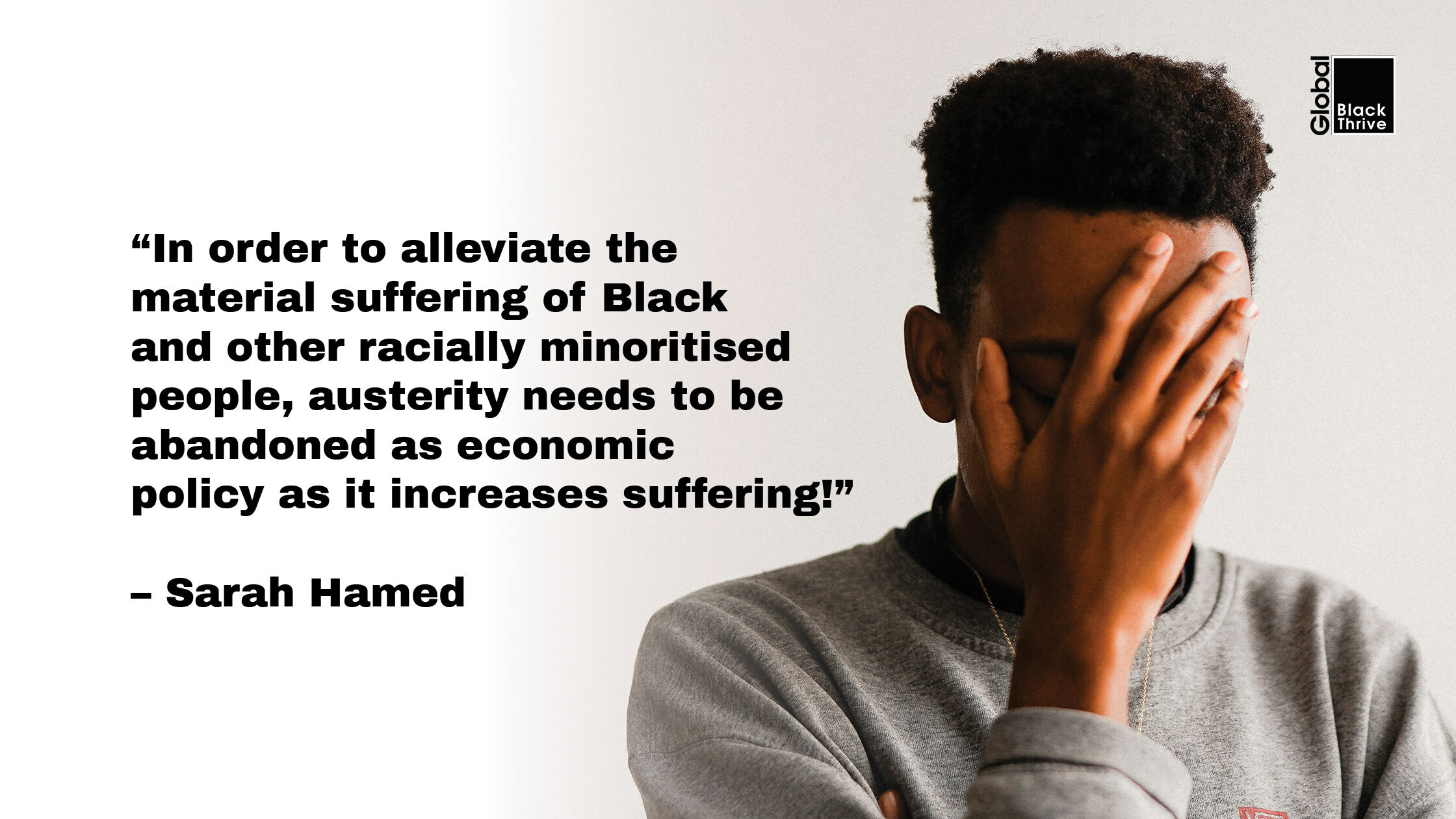
Cuts to Mental Health Services, Austerity, Racism and Beyond
In a previous blog, we discussed existing and persistent racial inequalities in mental health and care among Black people in the UK. We argued that while these racial inequalities in mental health result in detrimental effects on Black people’s lives, the role that racism and racialisation play in these inequalities is minimised due to the prevalence of a colourblind mentality that belittles Black and racially minoritised people’s experiences of racism.
There are several ways to counteract the complexity of racial inequalities in mental healthcare, including a recognition of the role that racism plays across institutions in the UK. Further, preventative measures should be put in place to decrease the burden of mental health illness, and optimal antiracist and trauma-informed services need to be implemented.
According to the Royal College of Psychiatrists1, mental illness accounts for more than 20% of the disease burden in the UK, and an approximate amount of £36 billion in 2025/26 should be allocated for mental health services. This spending should include antiracism interventions directed towards undoing racial inequalities that affect Black people and other racially minoritised groups.
Rather than ensuring public spending on mental health services is adequate and responsive to both the mental health crisis and consistent racial inequalities, the proportion of NHS funding to mental health services will decrease from 8.87% in 2022/23 to 8.71% in 2025/26. According to the Royal College of Psychiatrists2, this decrease will result in these vital services missing out on an estimated £300 million or more that they would have received if their share of spending had been maintained.
As racism is readily sidelined as a non-issue or a minor issue in healthcare, a decrease in spending on mental health services may result in further invisibilisation of racism and less focus on racial inequalities, as well as less emphasis on the needs of racially minoritised people, which may exacerbate these inequalities further.
Austerity’s Wider Impact
Cuts or austerity measures are not only implemented in healthcare, but also in other institutions across the UK. These austerity measures, increasingly introduced as the dominant economic policy based on a free-market ideology, are designed to reduce welfare provision, resulting in a shrinking social state3.
Austerity has had a profound impact on the welfare state, especially the most vulnerable in society, including Black people and other racially minoritised people. Due to austerity measures, the UK has become one of the most unequal countries, ranking as the 9th most unequal in terms of income inequality among all 38 OECD countries4.
The UK’s wealth inequality is much more severe than income inequality, with the top fifth taking 36% of the country’s income and 63% of the country’s wealth, while the bottom fifth has only 8% of the income and just 0.5% of the wealth in 2022. These class inequalities are always racialised and gendered, with poverty disproportionately affecting the Black community.
For instance, while austerity measures have increased poverty rates in general, they have had an increased impact on low-income Black and Asian women who have lost around twice as much money as low-income White men. A study has shown that austerity measures have cost the average person in the UK nearly half a year in life expectancy between 2010 and 2019, with an increase in regional disparities5. The study showed that austerity measures resulted in about a 3% increase in mortality rates from 2010 to 2019.
Racism, Racialisation and the Welfare State
While austerity measures clearly exacerbate racial inequalities and are grounded in a free-market ideology which focuses on individualism, the freedom of capital, and the internal and external bordering, the gradual decay of the welfare state is often blamed on minoritised migrants and racially minoritised groups.
This results in a paradox where the poorest people—often racially minoritised people—are left to find individualised solutions to their healthcare, including mental health, education, housing and other social issues6. A failure to do so is articulated by a growing right-populist movement, as having to do with a lack of integration and a failure to adhere to European values closely aligned with Whiteness and racialisation.
Moreover, the diminishing welfare state and growing inequalities are seen as caused by racially minoritised groups, constructed as a burden to the state, rather than neoliberal and free-market economic policies.
These constructions only result in an aggravation of racism and racialisation, which is sidelined further as a cause of inequalities, while ‘race’ is invoked as a reason for these inequalities—i.e. an innate inherent characteristic among racially minoritised people that views them as exploitative and unable to contribute to society.
With ongoing and increasing cuts, this results in a vicious circle that increases racism, racialisation, class and gender inequalities across institutions, including mental health care.
Moving Forward
People with mental health issues must be provided with timely, responsive and adequate mental health treatment. To decrease racial inequalities, increased public spending on all institutions, including mental health, must be guaranteed.
Antiracism is a proactive strategy that needs to be understood within class and gendered lines—i.e. racism needs to be understood within class and gendered relations. In order to alleviate the material suffering of Black and other racially minoritised people, austerity needs to be abandoned as economic policy as it increases suffering.
References
Royal College of Psychiatrists. Main website. ↩
Royal College of Psychiatrists. “NHS mental health services facing cut of £300m” (2023). ↩
Ahlberg, B. M., Hamed, S., Thapar-Björkert, S., & Bradby, H. (2019). Invisibility of Racism in the Global Neoliberal Era: Implications for Researching Racism in Healthcare. Frontiers in Sociology, 4. ↩
OECD (2022). Income Inequality. ↩
Berman, Y., & Hovland, T. (2025). The Impact of Austerity on Mortality and Life Expectancy. Social Science Research Network. ↩
Davis, A. (2013). Recognizing Racism in the Era of Neoliberalism. Truthout. ↩
Authors
 Sarah Hamed. Head of Research and Evaluation.
Sarah Hamed. Head of Research and Evaluation.
Sarah Hamed is a medical sociologist specialising in racism in healthcare. At Black Thrive, she leads the development of a Research Institute and Observatory, designs new research approaches, and supports teams in tackling systemic racial inequalities. Her doctoral research examined racialised discourse among healthcare staff, and she has worked on issues of racism, inequality, and migration across Europe. Sarah has several academic publications on racism in healthcare, accessible here.

